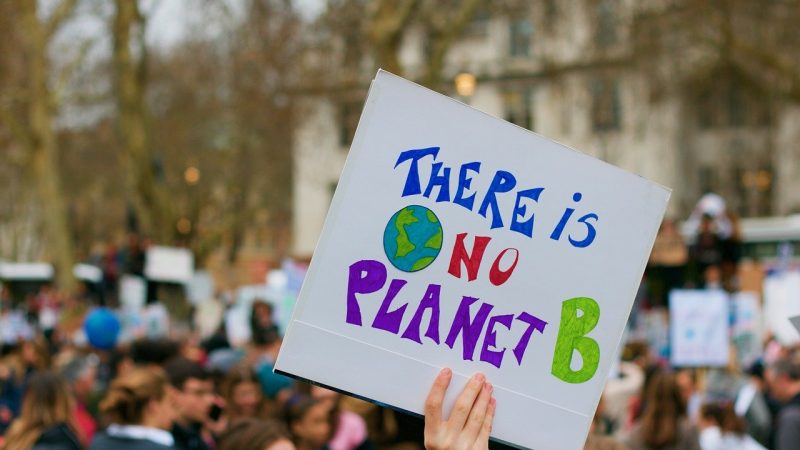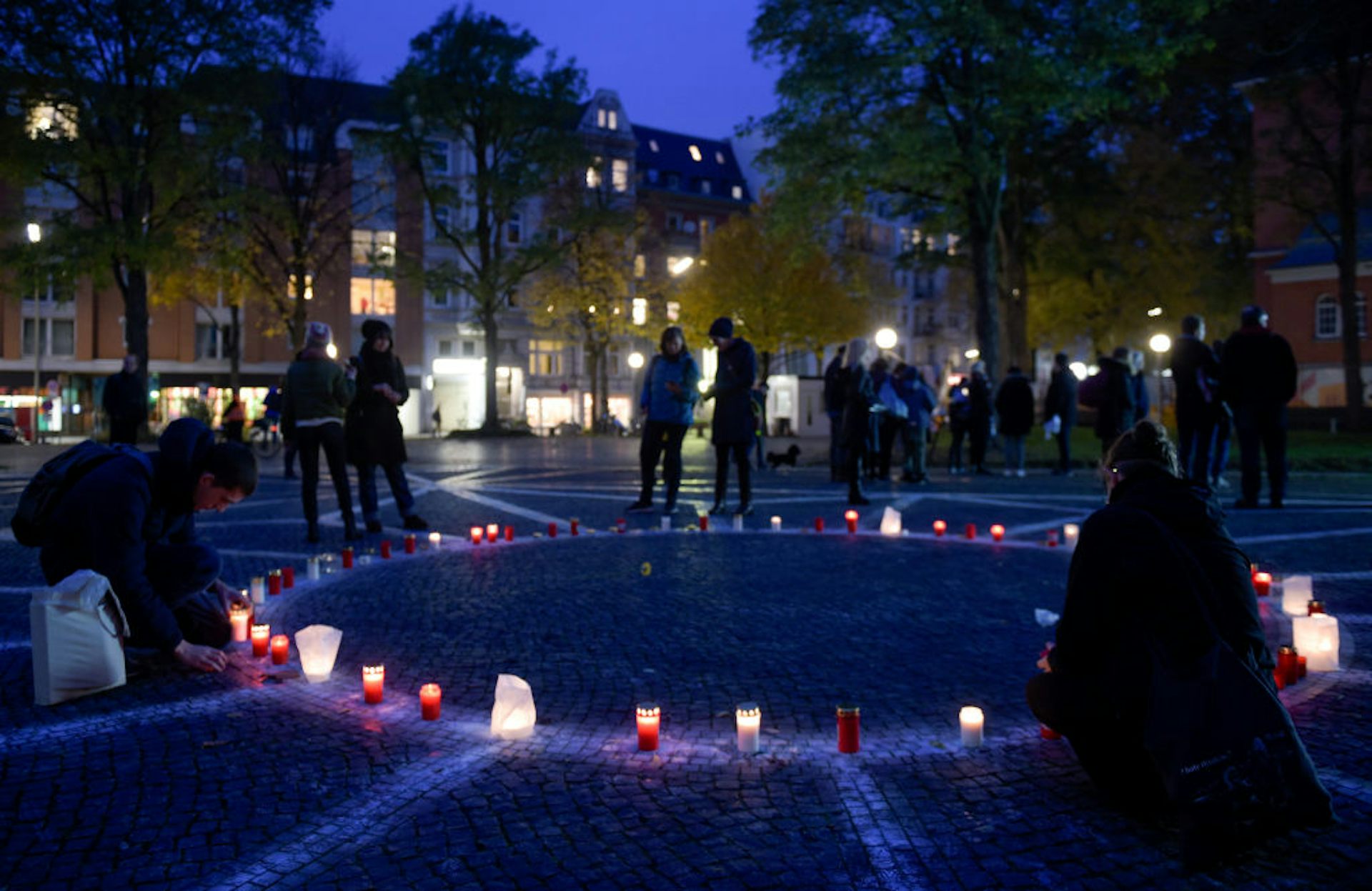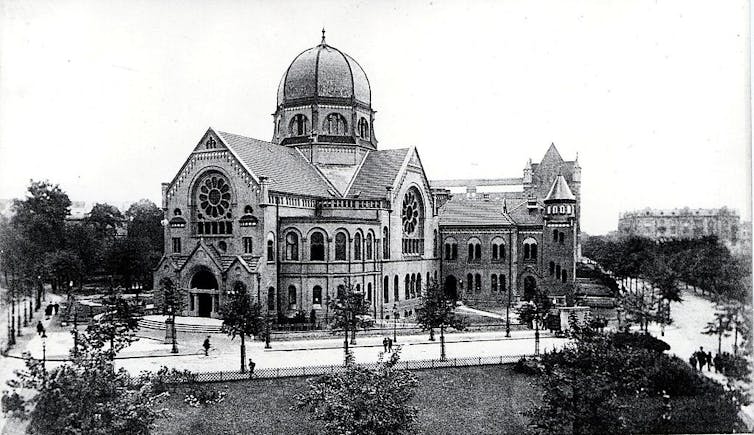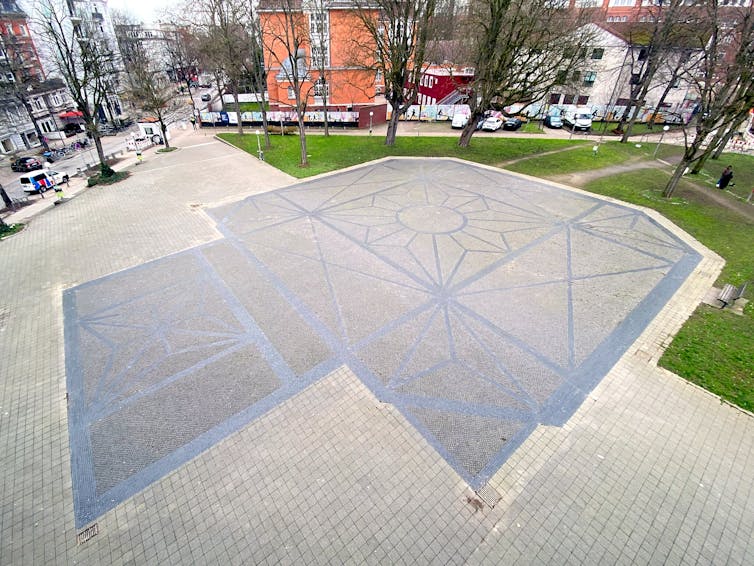CPGB
Editorial
Wednesday, November 6, 2024

Republican presidential nominee former President Donald Trump points to the crowd at an election night watch party, November 6, 2024, in West Palm Beach, Fla.
DONALD TRUMP’S victory in the US will embolden the hard right everywhere — including in Britain.
It underlines the ongoing crisis of liberal centrism, which applies well beyond the United States and has its roots in the long-term decline in working-class living standards across the Western world.
Britain is no exception. It’s masked by an electoral system that gifted Labour a huge majority this summer despite an actual decline in its popular vote. In terms of actual support, the biggest electoral shift last July was not left from Conservative to Labour, but right from Conservative to Reform UK, which secured over four million votes.
So there is no room for complacency about the right’s prospects here. Labour on current form is not well placed to defeat an insurgent right. It already polls below 30 per cent, neck and neck with a Tory Party that ought not to be in the running so soon after its worst ever election result.
An insurgent right can only be beaten by an insurgent, radical left. July’s election saw gains for the left, too, with the election of four Green MPs and five independent socialists, four of whom stood primarily on a platform of opposition to Israel’s genocide in Gaza.
All this must inform our response to a Trump presidency. The Democrats’ loss of support was connected to their complicity in Israel’s barbaric war.
Some liberals try to blame anti-war candidates for splitting the “left” vote. But a party facilitating genocide is not on the left. Blame lies not with those who couldn’t stomach a vote for Kamala Harris, but with a Democrat administration that continues to arm and fund Israel’s killing machine.
Trump, of course, is a more explicit enemy of the Palestinians than Harris. He has openly advocated policies the Democrats officially oppose, such as formal annexation of most of the West Bank by Israel.
The British government will likely fall in step with whatever the White House wants, so this must inspire still greater mobilisations in solidarity with Palestine. Israel and its backers must be isolated diplomatically, and Labour must feel real pressure to recognise the Palestinian state and enforce a total arms embargo on Israel.
But that does not mean exaggerating the differences between Trump and Joe Biden. Israel has been aggressively colonising the West Bank for years with effective support from every US administration.
Trump is readier to abandon lip service to the prospect of a sovereign Palestine, but lip service has done nothing for the Palestinians.
The problem is US imperialism, which must be opposed whoever is in power in Washington.
That also means resisting calls for greater European and British militarisation in response to the fears of liberal warmongers over Trump’s perceived lack of commitment to Nato or the war in Ukraine. Indeed, we should use Trump’s unpopularity in Britain to push for a decisive break with Washington and an independent foreign policy.
All this means rebuilding a mass movement for peace and socialism.
Now written out of history, Labour’s big advances in the 2017 election on a socialist manifesto remain the only example in the last decade of the party bucking the trend of declining support.
Hope that “things can, and will change” rested on a clear alternative policy offer involving public ownership and redistribution of wealth, and an army of activists taking that message to community after community.
Keir Starmer’s Labour offers neither. This simply highlights the importance of building a united front from below, uniting the huge peace movement on our streets with a labour movement ready to promote and organise for a real economic alternative.
Failure to do so, out of misguided reluctance to confront a Labour government, allows Starmer and Rachel Reeves to cling to a discredited market liberalism that is rejected by electorate after electorate: and consign Britain to the same fate that has just befallen the United States.
Trump’s Return a Disaster of the US and Planet – The Stop Trump Coalition is Back
By the Stop Trump Coalition
The return of Donald Trump is a disaster for the US and the planet – for women, for migrants, people of colour, for Muslims, for trans people and for everyone else his administration will target.
It is another boost to the global authoritarian right and the consequences could be dire for for the ongoing genocide in Gaza, the increased killings in the Occupied West Bank, and wars in Lebanon and Ukraine. It will embolden violent racist far-right movements seen on our streets in the UK this summer, targeting Muslims, refugees and asylum seekers.
It is another blow to efforts to limit global rising temperatures and climate catastrophe.
The UK Stop Trump Coalition was formed in January 2017, after Trump was elected for the first time and he declared a “Muslim ban”. Now Stop Trump is mobilising again, ready to oppose his policies once he takes office as well as any UK visits.
The US Democrats have again failed to defeat Trumpism, having refused to provide a real alternative on the economy or on Gaza. We cannot allow our own government to keep making the same mistakes.
It falls to us all – workers, civil rights activists, feminists, anti-racists, the climate movement, genuine progressives of all stripes – to organise a mass movement and push back, in the UK and across the globe, not only against Trumpism, but also the failed politics that keep it alive.
We plan to work in the coming weeks and months to build a broad coalition ready to respond to what comes next.
- You can sign up to take part in upcoming actions with Stop Trump Coalition here.
- This article was originally published by the Stop Trump Coalition on 6 November 2024.
With Trump’s win, we must redouble efforts to end the genocide in Palestine
By the Stop the War Coalition
Trump’s decisive victory in the US presidential election puts him in a strong position. Trump is a racist and Islamophobe, who has engaged in warmongering in his previous term and is a supporter of Benjamin Netanyahu in Israel.
He won for a range of reasons, perhaps most importantly economic discontent. His victory also owes much to the refusal of traditionally Democrat voters to endorse Joe Biden and Kamala Harris’ support for Israel’s genocide in Gaza and for extending the war on the Palestinians to Lebanon.
Harris lost the votes of Muslim and Arab Americans, as well as many others, on this issue.
However, Trump’s support for Netanyahu’s policy is clear. And for all his talk of wanting to stop wars, his record when he last held office shows that far from delivering peace, he doubled down on US war and proxy wars, in Syria, Somalia, Afghanistan, and Yemen.
He also ordered new nuclear missiles, ripped up nuclear treaties and demanded increased NATO military spending.
Trump talks of bringing peace to Ukraine, but he is committed to an increasingly hot war with China. He is also demanding that Nato allies increase their defence spending at the expense of funding areas such as health or education.
Trump has also talked of “two enemies” – outside and inside – and has vowed to defeat that “outside enemy” by mass deportations, reinstating his travel ban on people from predominantly Muslim countries and expanding it to prevent refugees from Gaza entering the US.
Stop the War convenor Lindsey German said:
“A Harris victory would not have stopped Israel’s genocide in Gaza or drive to war across the Middle East, but Trump’s racism, Islamophobia and bigotry, and his close relationship with Netanyahu could well enable Israel to pursue its desire for full control of Gaza and the West Bank.
“We face an extremely dangerous situation worldwide, with a growing arms race. We in the anti-war movement must redouble our efforts to end the genocide and wars in the Middle East. We also need peace in Ukraine, for the west to stop arming Ukraine, and for an end to the escalation of militarism and conflict aimed at China in the Pacific.”
- You can follow Stop the War on Facebook, Instagram and Twitter/X.
- If you support Labour Outlook’s work amplifying the voices of left movements and struggles here and internationally, please consider becoming a supporter on Patreon.
Three-quarters of Labour voters unhappy at Trump victory, poll reveals
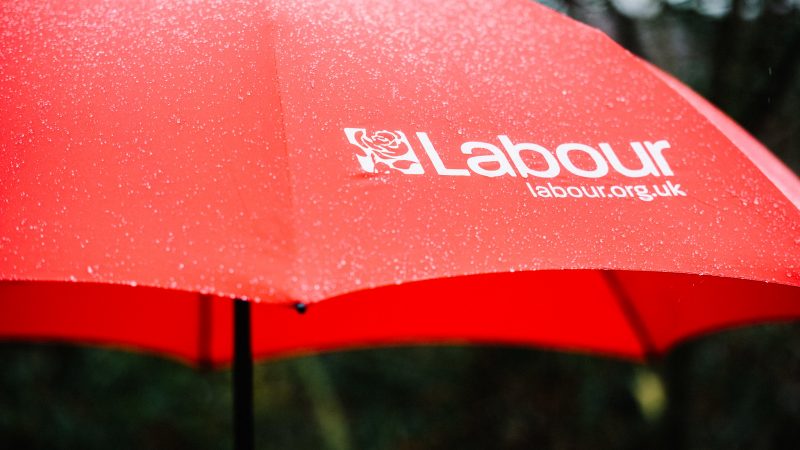
Three-quarters of Labour voters are unhappy at Donald Trump’s victory in the US presidential election, latest polling has revealed.
A survey by YouGov found that 75% of Labour supporters were either fairly or very unhappy at the result in America, with only ten percent happy at Trump returning to the White House in January.
Amongst other parties, 79% of Liberal Democrat voters expressed unhappiness at the election result, compared to 51% of Conservatives and just 22% of Reform UK voters.
More than two-thirds of Labour supporters (72%) also thought Trump’s election would be bad for Britain, compared to just nine percent who thought his second term would be good for the UK.
However, Labour voters were divided on how much of an impact Trump’s election would have on their life, with 40% believing his return would not affect them very much and 40% thinking it would affect them either a fair amount or a lot. Only seven percent thought it would not affect them at all.
Liam Byrne: ‘Trump’s victory is a warning to Britain and Europe – fix inequality or populists will win’

In the end it was not even close. But the scale of President Trump’s emphatic re-election is not simply a shock, it is a warning to Labour and the European left. Unless we find ways to fix the yawning chasm of inequality that divides our nations, then populists everywhere will continue their onward march.
It will be a few days until we have time to inspect the details of Vice President Harris’ defeat. But there was one clear story about the last time President Trump sailed to victory. The places that were left behind by American growth, the places at the sharp end of growing inequality, were far more likely to vote for Trump.
But guess what?
The same dynamics hold true for the UK, France, and Scandinavia. Those places where the growth in wealth did nor keep pace with the national average were the places that voted for Brexit, Le Pen in France and the Far Right in Scandinavia.
In a seminal piece of political science research, authors Ben Ansell and David Adler reported, “the geography of wealth inequality offers a convincing explanation for the pattern of populist vote share.”
Trump’s re-election shows these forces are not dissipating. Indeed, they may be growing stronger. And the same effect was clear at the last general election here in Britain.
In a new analysis of the election results I looked at the relative increases in aggregate wealth since 2006/08 and the Reform vote in each region at the 2024 general election. What emerged is a clear pattern; those regions where wealth grew least – the North East, the East and West Midlands – voted more heavily for Reform. Where wealth growth was largest – in the South East – the Reform vote was lowest.
The lesson from Trump’s win
This has a clear message for Labour. Bidenomics-style investment is important, but it is not enough. Investment takes a long time to yield results, but voters’ patience is short – nor are voters feeling very optimistic about the future.
In fact new research by the Policy Institute at King’s College London and the Fairness Foundation, and shared on Tuesday night in the House of Commons, showed that here in the UK, people feel the gap in wealth between rich and poor is too big; that the richest in society are now more powerful than national governments – but voters do not think this will change by the end of the parliament.
These sentiments are a clear warning. If we do not fix this, we too will be in peril of the sort of populist surge that took Trump back into office. And the remedy is pretty clear.
Investment in our economy to grow our economy is mission critical. But just as important is a project that connects rising prosperity to those families and places that feel they have been left behind.
It must be a project that not only raises real incomes but actually helps improve the wealth levels of voters who have simply been left behind by the
The Democrats failed to address the deep economic crisis that persists in the US, allowing Trump's lies to prove victorious

Trump will not solve the economic crisis in the US (Photo: Liam Enea, CC BY SA 2.0)
By Thomas Foster
Wednesday 06 November 2024
Trump sold the lie that he’d “Make America Great Again” and bring about a “golden age”. The Democrats said America was already great—after failing to improve the lives of the working class.
Trump harnesses a real feeling of resentment, of being left behind, forgotten and ridiculed.
Working class people are suffering and desperate for change in the United States. A glance at the US economy shows how millions of people are suffering.
An AP poll showed that eight in ten voters wanted at least a “substantial change” in how the country is run—including one quarter who said they want “total upheaval”.
Government assistance has faded, demand for foodbanks has surged, food insecurity sky-rocketed and homelessness is at a record high.
The number of people who have difficulty paying for basic household expenses has increased from 32 percent in 2020 to 39 percent in 2024.
That’s now 130 million people out of the total US population of 330 million. Of all US adults, 60 percent have seen their disposable income decline in the last year. And 58 percent live pay cheque to pay cheque. In comparison, 31 percent of British people say they do.
And there are huge long standing structural costs to US life that cause significant problems for working people.
Take healthcare. The privatised US healthcare system means that an essential service remains a huge expense for many Americans.
Just over half of US adults say it’s hard to afford healthcare, with nearly two in five saying they put off or skipped treatment entirely because of cost.
People without health insurance are often faced with a choice between bankruptcy and death.
And the number of people struggling for food is soaring, reaching record highs in 2024. Charities point to high food prices, the gradual disappearance of pandemic-era aid and unaffordable housing.
Nearly 44 million people are living in households where they struggle to get the food they need because they lack money and resources.
That includes 13 million children according to the last report by the US Department of Agriculture. And record levels of homelessness unsurprisingly come alongside high eviction rates and a crisis in affordable housing.
The number of renters who spend more than 30 percent of income on rent and utilities was 22.4 million in 2022, another all-time high. When it comes to childcare, parents are forking out tens of thousands of dollars a year.
In response to hardship, people are ramping up credit card debt with more than a third of people saying they have more credit card debt than in emergency savings. In the last three months of 2023, credit card debt reached a 22 year high of over £1 trillion.
Currently 21 million people are behind on utility bill payments and 25 million are behind on credit card or personal loan payments. These are the highest numbers since the 2007-2008 financial crisis. Inequality has escalated out of control in the US since politicians introduced neoliberal policies in the 1980s.
Yet the income of CEOs in the largest US firms rose by 1,460 percent between 1978 and 2021. The average worker’s pay grew during the same period by only 18.1 percent. To give a sense of the scale, as of 2021, the average CEO got 399 times more than the average worker.
The reality is that the US economy isn’t working for ordinary people—and the Democrats have failed to do anything more than paper over the cracks in the last four years.
The Biden-Harris administration was marked by the state having a prominent role in directing investment in the form of tax incentives, direct subsidies and tariffs to encourage production. But what it did was a far cry from its progressive promises.
It passed bills such as the American Rescue Plan in 2021, which sent out £1,100 in stimulus cheques to most Americans.
It also expanded unemployment insurance, child credit and rental assistance. But it was temporary—a pop-up safety net—with provisions expiring at the end of the pandemic, leaving the deep inequalities unchanged and the crisis unaddressed.
Then there was the Infrastructure of Jobs Act in 2021 that allocated £1 trillion for transportation and infrastructure projects.
The Democrat’s flagship Inflation Reduction Act of 2022 included investments in green energy, including £300 billion in climate spending. But that funding was spread out over a decade.
Most of it was in tax credits and subsidies to big businesses to incentivise private investment in clean energy and green manufacturing.
This is due to its policies being aimed at shoring up the stability of US capitalism, with the US state taking a more active role in bankrolling its corporations to compete globally.
There’s huge class anger in US society. But the Democrats can’t point it to the real enemy—the capitalist class—as this is who they represent.
The result is what we saw on Tuesday—Trump’s anti-establishment fakery and anti-migrant ideas sweeping through.
Defend democracy! Defend the US left, labour movement and minorities!

Edited Wednesday 6 November
With most of the results in it looks like Trump has retaken the US Presidency.
Although less likely than if he had lost, Trump may call people on to the streets to demonstrate for him. Other immediate and dangerous measures — some taken as revenge on his enemies — will follow.
That is why the US labour movement must organise to protect itself and help to defend Black and migrant communities. Despite the dangers, democrats must come out onto America’s streets to stand up for democracy.
The left must press the Democratic leadership to stand up to Trump’s demagogy. The left must demand the Democrats fight.
Trump, who is a bitter and vengeful man, will be target his political enemies.
Many of Trump’s supporters — around 65% — hold the unhinged belief that he won the 2020 Presidential election and may be motivated to harass Republican rivals.
We may well see an increase in racist street violence by a section of Trump supporters. There is a vast hinterland of racism in the US. 76% of Republicans, according to polls, do not believe the legacy of slavery affects Black people. Now a growing number, in the wake of vicious propaganda and years of anti-Latino migration policies, are hostile to migrants.
Trump, the convicted felon and legally-defined sexual predator, will begin to carry out a reactionary anti-migrant, anti-worker, racist programme. The US crisis in reproductive health care will get worse. Rights for trans people will be further attacked.
Friend of climate change deniers, Trump is a danger to the planet.
Trump has promised to sack officials he hates, sack many other civil servants (paralysing essential services), pack the state machinery with his people, purge the leaderships of the armed forces and secret services.
Trump promises to limit the right to protest and strike, to roll back labour and union rights, to attack electoral processes and further limit voting rights.
Trump promises to "green light" anything and everything that Netanyahu does in his bloody war on the Palestinians. Soon his administration will begin to pressure Ukraine into accepting a rotten "peace" with Putin.
Trump’s corps of political advisors will — after the experience of his first, chaotic Presidency — ensure that whatever Trump has highlighted in his rambling election addresses will have coherence.
Most of all Trump defends the rich, and their right to exploit and to escape taxes. And this is what endears him to the US elite.
Trump’s reactionary personality and vision, now completely dominant in the Republican Party, still does not represent the majority of US citizens. Trumpism has, however, managed to polarise US politics and has given direction to grievances that have arisen from social and economic crises over the past two decades: the destruction of traditional industries, the 2008 financial crash, the pandemic, a rise in the cost of living and worsening inequality.
Glaring inequality, lack of free health care for all, precarity, debt, mass opioid addiction, inadequate housing and expensive education all blight American life.
The Democrats certainly do not have political answers to the social crisis. They are in part to blame for many of the enduring problems of US society. What they have not done in the last four years in power is to blame for Trump’s continuing popularity and their own electoral failure. In the future the US left and working-class will go beyond the Democrats. But the Democrats and Harris were clearly preferable to Trump and the dangers that would be unleashed by him.
That is where we are and the socialist left, and, centrally, the unions, have to rise to the task and present an alternative.
It is also our fight as socialists in the UK. It is our fight because if Trump wins the far right around the world will get a boost.
Is this fascism? We think not, as the Trump movement has not got the organisational or ideological profile associated with the Mussolini or Hitler movements. The fascist moment in history is not being repeated; what we see in India, Turkey and Hungary is not fascism, but authoritarian, far-right, state-manipulated reaction. Trump, Orban, Farage — and to their right, characters like Tommy Robinson — are “brothers-in-arms”, united by their respective ultra-nationalisms and opposition to progressive social change.
What it also is, is a mortal threat to democracy and workers’ rights. The need to defend liberty and democracy is more urgent than it has been for decades. We defend even the restricted, peculiar and limited democracy of the US, with its rigged Supreme Court and ridiculous Electoral College, wrapped around a plutocracy.
Our task will be to support our allies in the US and their fight to protect the ability to organise — the right to protest, free speech, to unionise, to strike, to curb police powers and to demand the radical reform of the brutal racist prison system.
We fight for workers’ democracy, for workers’ liberty.




